#Backstrap
Explore tagged Tumblr posts
Text
Low space & low budget weaving
Want to weave but don't have space for a loom? Have a few sticks and yarns but no DIY skills? Come, be tempted anyway. Weaving is a whole family of crafts, some of which don't require a loom at all.
Small-ish looms like box looms (as basic as yarn wrapped around a cardboard grocery tray), inkle looms, and rigid heddle looms exist, but I'm assuming every possible space for a box in your life is already filled. In this post we're going even smaller and cheaper. As far as possible, everything either is flat enough to stow behind/under furniture or rolls up safely into a bundle of just sticks and yarn.
Many of these crafts have some crossover - the same setup can be used for multiple styles of weaving. Most of them can be improvised at home depending on what you have on hand, or if you need to buy something there is not a huge gulf between homemade vs professional equipment. Alas I am not skilled in any of these and my descriptions will not be wholly accurate; corrections and additions welcome! If you need help, I'd only be able to tell you to seek out books and tutorials yourself, ask other weavers, and just try stuff out.
All photos included with permission. My thanks to the people allowing me to use their projects! I saw so many gorgeous and skillful projects when assembling this and I wish I could have included them all.
Fingerweaving
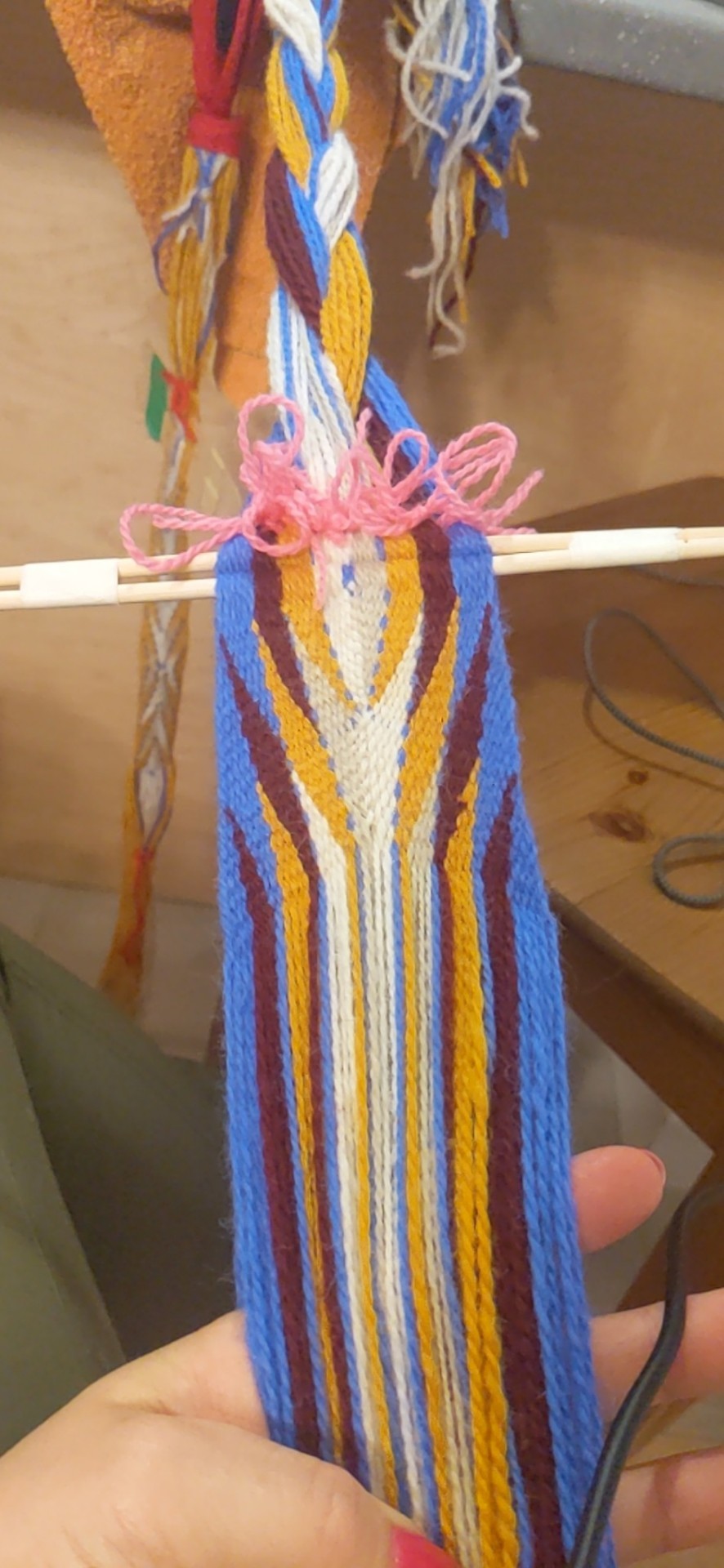
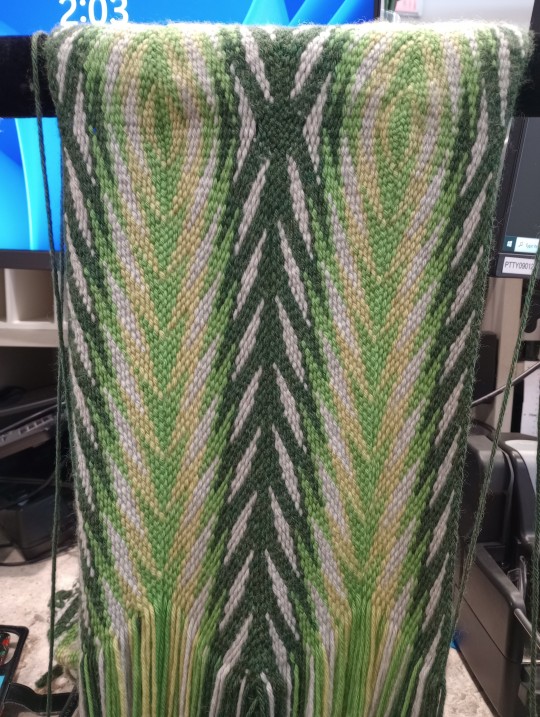
Projects by @kitteniestkitten (here) and @wefty-weaver (here)
Culture - I am aware of this as a Native American technique, I don't know its history with any more specific nation.
Fabric - "Warp faced" cloth of any width, insofar as warp and weft have meaning for this craft as the weaving is on a diagonal. Often used for sashes or blankets.
Method - There is no loom! A couple sticks hold the yarns to begin with, but then it is all freehand. Starting at one corner, you use your fingers to weave a strand through the other strands, and... that's it. Very simple beginnings work up to very complex patterns that no loom is capable of. The whole project can be rolled up when not active.
Backstrap loom
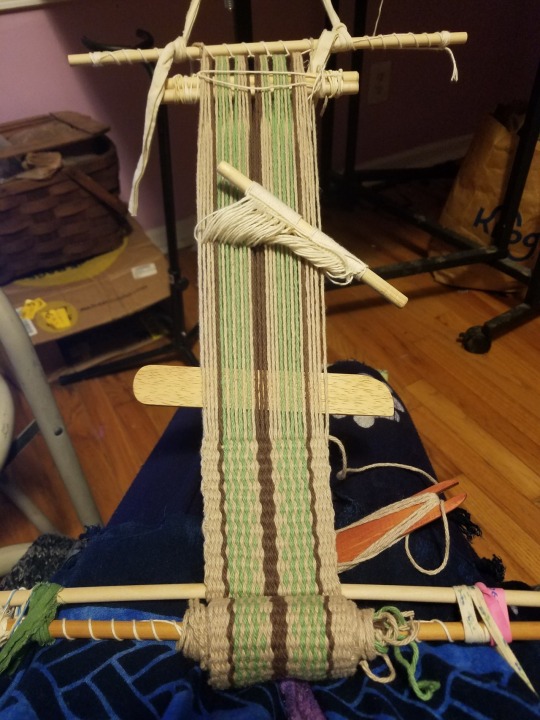
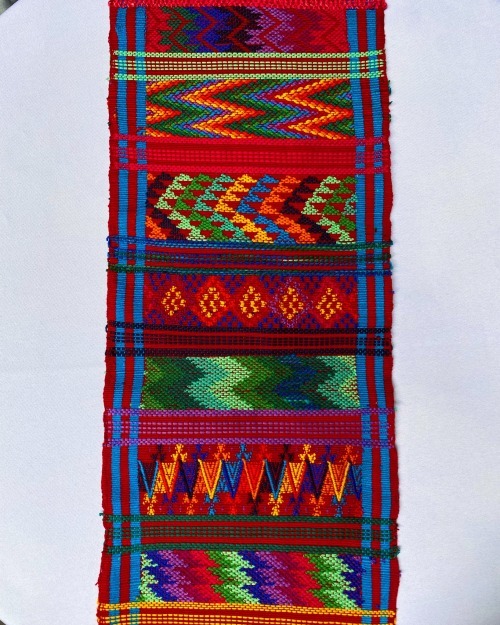
Projects by @calendae-creations (here) and @weavingforlooms (here)
Culture - I am most aware of this from the Andes but I think it is much more widespread than that.
Fabric - Warp faced or balanced fabric of any width up to your own reach, suitable for blankets and clothes and many other things.
Method - You are the loom! Several horizontal rods hold and manipulate the warp threads but your body provides the tension, with the other end hooked to some furniture or around your own feet. When not in use, you can roll up all the equipment into a small bundle of yarn and rods. You can also use a backstrap loom setup for other methods like tablet weaving.
Warp weighted loom
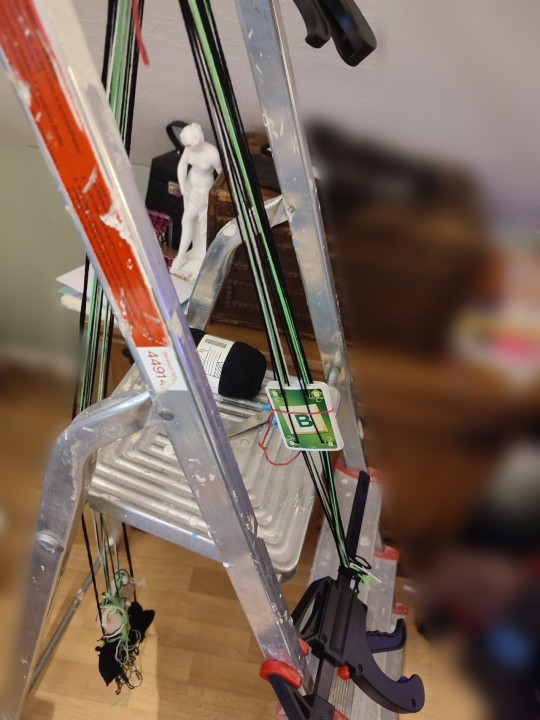
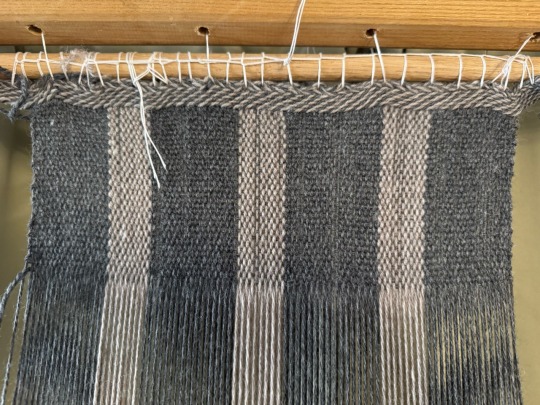
Projects by @shadowcreepling (here) and @doctormead (here)
Culture - used by ancient Greeks among many many others.
Fabric - any kind of fabric at any size. Shadowcreepling is using a warp weighted loom for a tablet-woven band, Doctormead is probably using heddle rods to make a wider piece of cloth.
Method - the warp threads are held by a bar at the top and tensioned with weights on one end that hang down towards the floor, then the weft is woven into them with any method such as tablets, heddle rods, or by hand (if you have a lot of patience) and beaten into firm fabric at the top or bottom of the loom. Warp weighted looms can be very big, but they are simple and can also be very small and taken apart when not actively weaving.
Tablet weaving / card weaving
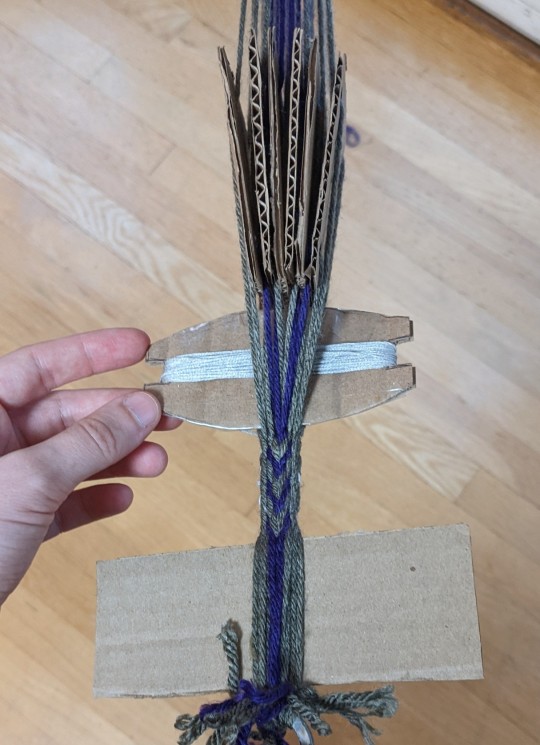
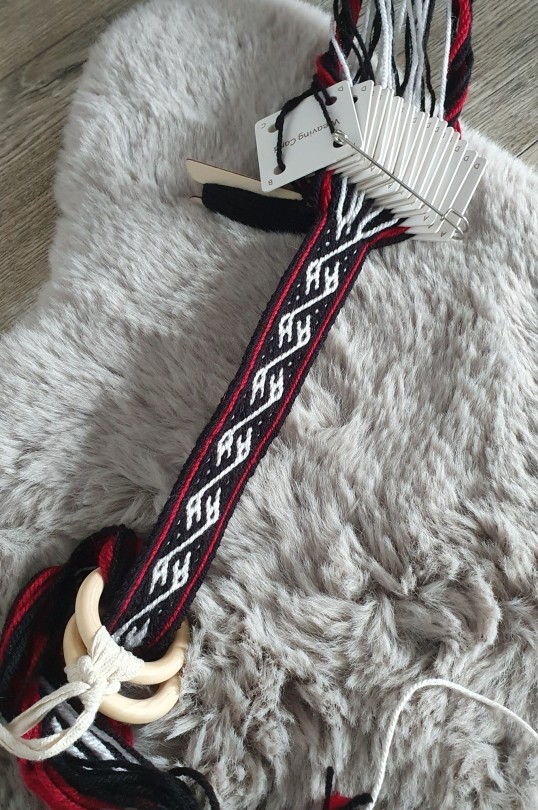
Projects by @damage-ko (here) and @foxease (here, hardware from CellesKit on Etsy)
Culture - found as far apart as textiles (geographically and temporally) from Byzantine Egypt and the Vikings
Fabric - a warp faced fabric with patterns made by twining warp threads around each other, usually used for strong narrow bands like collars, belts, and shoelaces.
Method - the cards hold open the shed so you can pass the weft through, then rotate the cards to advance the pattern. Many people make their own with cardboard or playing cards, or you can buy some. The rest of the weaving setup can be improvised with a backstrap (or just a shower curtain hook clipped to your trousers), a cardboard box loom, or warp weights.
Rigid heddle band weaving
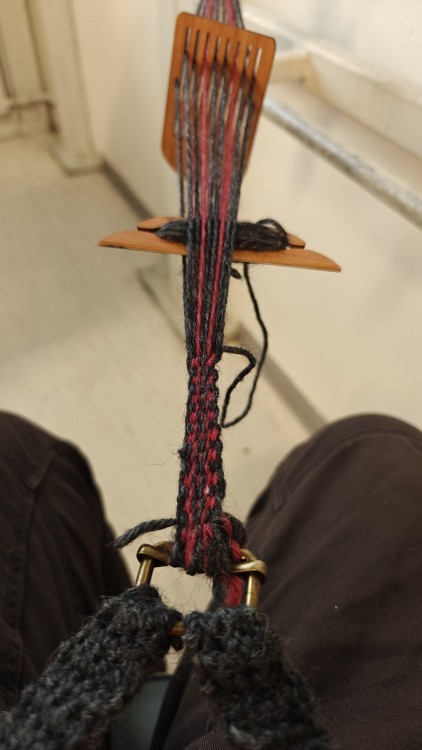
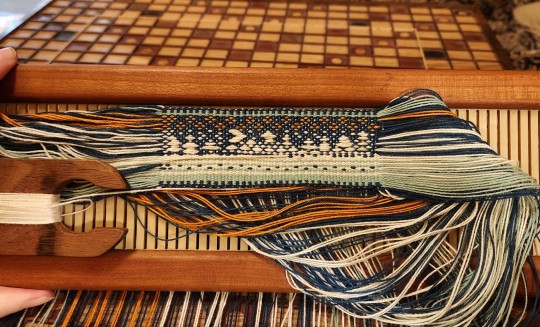
Projects by @pisaracraft (here) and @crookedtines (here)
Culture - small rigid heddles like the first project have been found in Roman archaeological sites across Europe. The larger rigid heddle in the second project is being used for "baltic pickup" style designs on the band.
Fabric - can be warp faced or a balanced weave, size limited by the size of your heddle.
Method - you provide tension with any setup you please such as an inkle loom, backstrap, or warp weights. The heddle creates sheds so that you can pass weft yarn through the warp easily. Infinitely many "pick-up patterns" let you weave patterns and even words into the cloth.
Pin loom / potholder loom
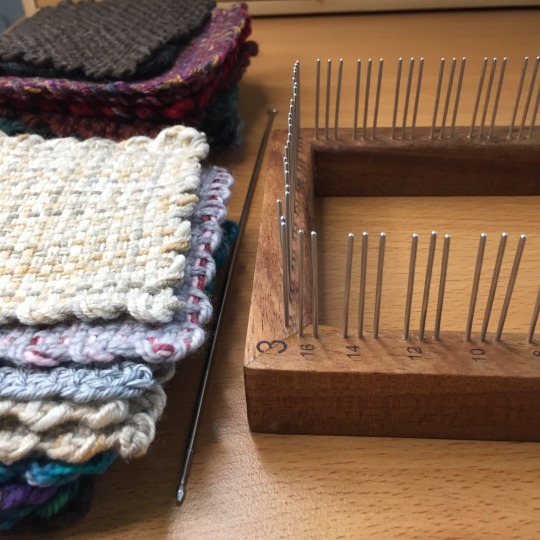
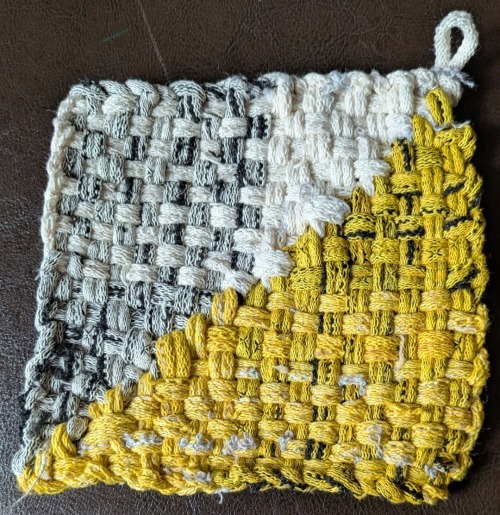
Projects by @pardalote (here) and @weavingmyheartout (here)
Fabric - a small square (or rectangle or triangle) of balanced weaving, which can be used alone or patched together into larger fabrics. Pin looms are finer and suitable for many knitting/crochet yarns, potholer looms are chunkier and designed for big elastics, but the method is similar.
Method - wind yarn lengthways around one set of pins and then pull yarn widthways through these strands with a hook. Or, work at 45 degrees in continuous strand weaving! Lots of room to experiment with colour and texture. You can improvise a pin loom by cutting notches in a square of sturdy cardboard.
Needle weaving / stick weaving / peg loom
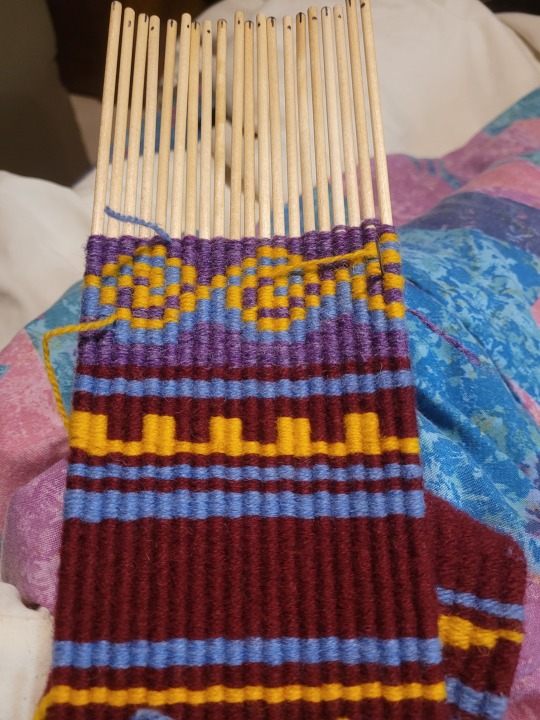
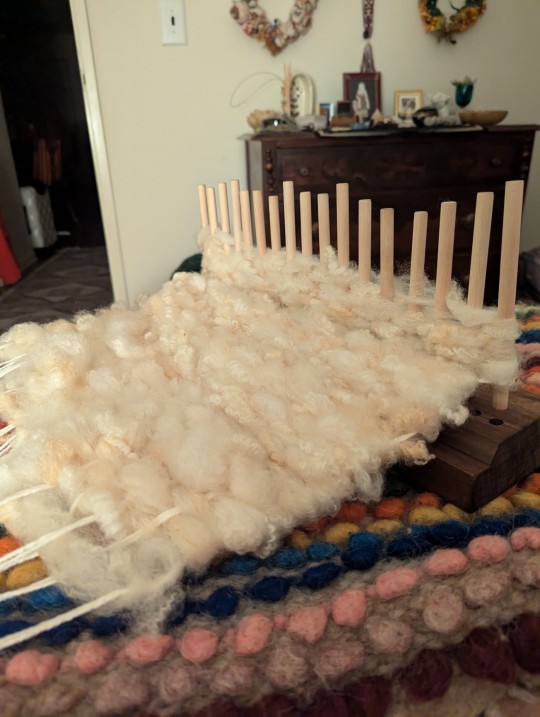
Projects by @thaylepo (here) and @pastelispunx (here)
Fabric - weft-faced fabric and rugs of any size.
Method - thread long thin warp threads through the pegs, then wind a thick weft (eg heavier yarn, sheep fleece, or long scraps of fabric) around the pegs. Push the weft down along the pegs as they fill up, so that it slides off onto the warp. The pegs can be secured in a base to make a peg loom for large projects, or just handled freely. I believe these evolved as separate crafts and the nuances are different, but the overall method is similar.
Frame loom / tapestry loom
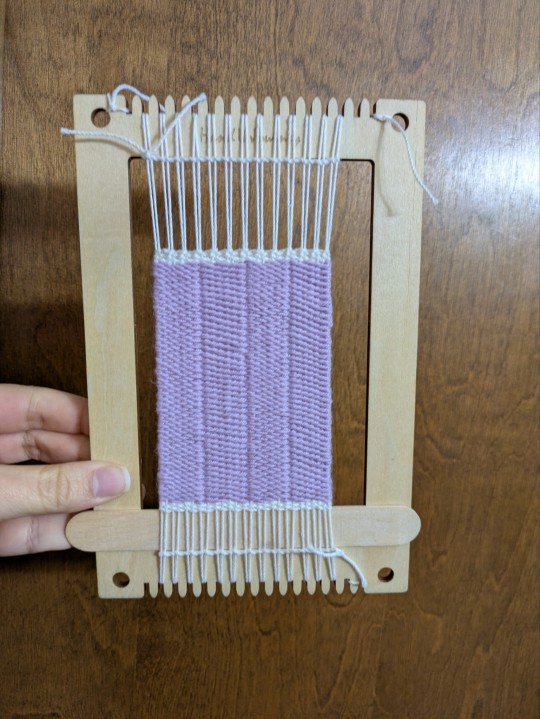
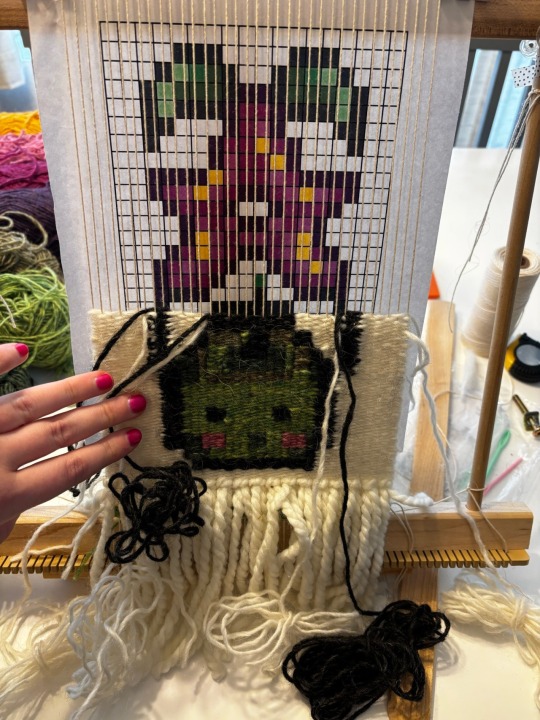
Projects by @squeakygeeky (here) and @battlestar-gasmacktica (here)
Fabric - weft-faced or balanced fabric ideal for wall hangings and upholstery, size limited to the frame being used.
Method - (usually) thinner warp threads are wound round a frame, such as heavy cardboard with notches cut in the end, a picture frame, or a small and flat purpose-made loom. Thicker weft threads are woven in by hand using needles or just small lengths of yarn. Some people make lifelike images, others make more ordinary fabrics or geometric patterns.
Bobbin lace
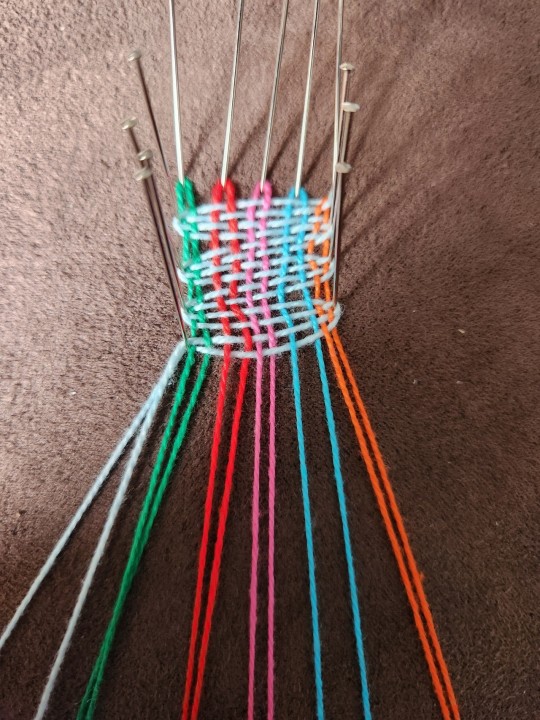
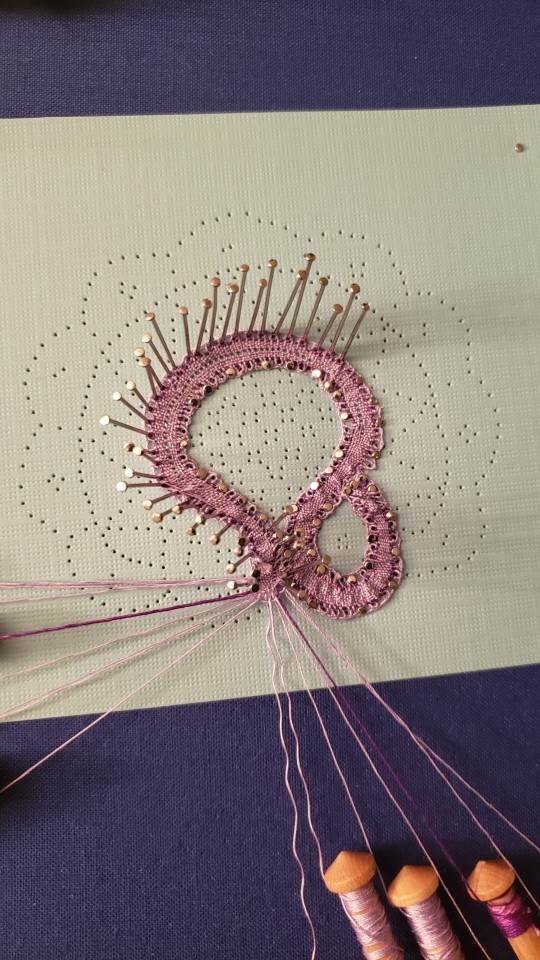
Projects by @crochetpiece (here) and @noxx-notions (here)
Culture - began in renaissance Italy and spread throughout Europe, often as a cottage industry.
Fabric - balanced fabric usually made of very thin threads in freeform shapes. It's not usually considered "weaving" but the basic cloth stitch is definitely a woven fabric!
Method - each thread is wound onto a bobbin (e.g. a clothespeg) and then bobbins are crossed over each other to weave threads together. The lace is pinned to a cushion to hold everything in place while the design grows.
#long post#weaving#beginner weaving#weaving resources#(deep breath)#fingerweaving#backstrap loom#tablet weaving#card weaving#warp weighted loom#backstrap weaving#peg loom#pin loom#frame loom#tapestry loom#cardboard loom#bobbin lace#potholder loom#rigid heddle#band weaving#stick weaving#needle weaving
4K notes
·
View notes
Photo
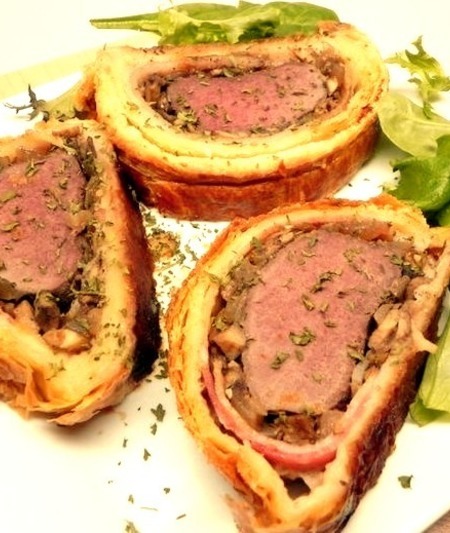
Pork Recipe This elegant-looking, delicious, and simple venison Wellington is ideal for dinner parties.
0 notes
Photo
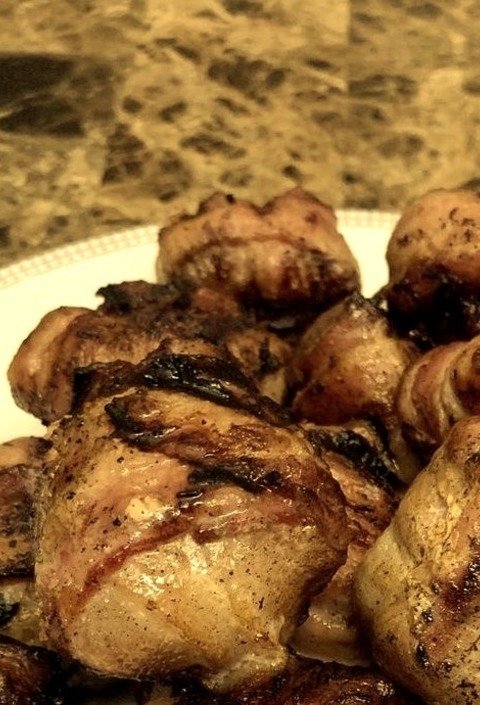
Recipe for Bacon-Wrapped Grilled Elk Backstrap Here's a delicious way to prepare elk: seasoned pieces of backstrap are wrapped in bacon, and grilled. This tasty meal is ready in under half an hour! 1/2 teaspoon onion powder or to taste, 2 pounds elk loin cut into 2 ounce pieces, 1 tablespoon liquid smoke flavoring, 1/2 teaspoon black pepper or to taste, 1 tablespoon Worcestershire sauce, 1/2 teaspoon garlic powder or to taste, 16 slices thick cut bacon
0 notes
Photo

Bacon-Wrapped Grilled Elk Backstrap Elk can be prepared in a delicious way by grilling seasoned backstrap pieces that have been wrapped in bacon. It only takes 30 minutes to prepare this delicious meal!
0 notes
Text
Venison Wellington
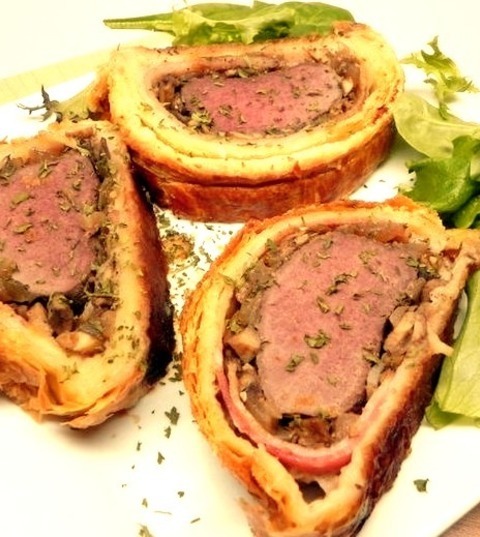
This elegant-looking, delicious, and simple venison Wellington is ideal for dinner parties.
1 note
·
View note
Photo

Pork - Venison Wellington This elegant-looking, delicious, and simple venison Wellington is ideal for dinner parties.
0 notes
Text
I started practicing pick up weaving yesterday, and after some 10 cm of trying to figure out the technique without any pattern, I started doing this very simple pattern.
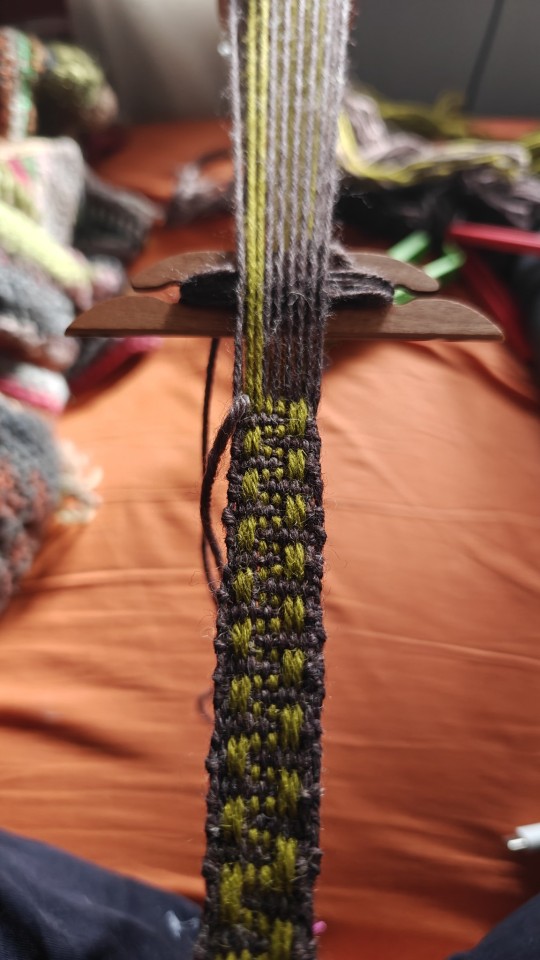
Let's not talk about how those first 19 cm look like xD
137 notes
·
View notes
Text

A gift for my husband's mother, woven on a backstrap loom with worsted weight cotton yarn.
#weaving#textile arts#art by me#so! i did not do any drawing BUT i finished this project which has been ongoing for a little over 2 years now#just in time for Christmas!#it's good to do physical hobbies agai#backstrap loom
65 notes
·
View notes
Note
I'm certain that the answer is "like chicken" but what do chabbits taste like?
Like rabbit :)
#which doesn't taste exactly like chicken ftr#they are both white meat though#rabbit backstrap/lion is similar texture to chicken breast and legs is legs#jaytext
244 notes
·
View notes
Text

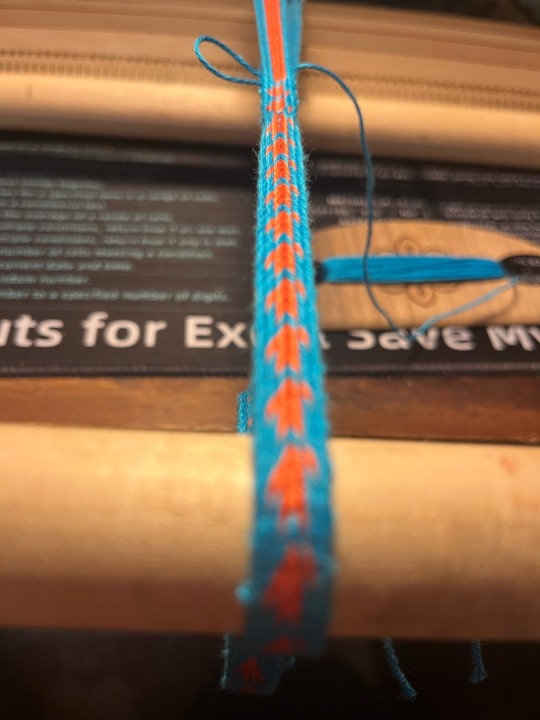
🐠
I fixed the loom!
#cotton khaleesi#cottonkhaleesi#weaving#card weaving#tablet weaving#the great shoelace explosion of 2025#just in time too. backstrap weaving was wreaking havoc on my back muscles :(
36 notes
·
View notes
Text
Can someone please tell me if it's possible to get started tablet weaving with nothing but a pack of playing cards, yarn and a pair of carabiner hooks? I am broke yet I have been bitten by the tablet weaving bug
57 notes
·
View notes
Text
A while back @optimistinchief wanted to see how my string heddle setup looks like. And now finally I'm playing around with some more swatches. Which means string heddles.
It's really very simplistic. And I'll try to demonstrate to the best of my ability.
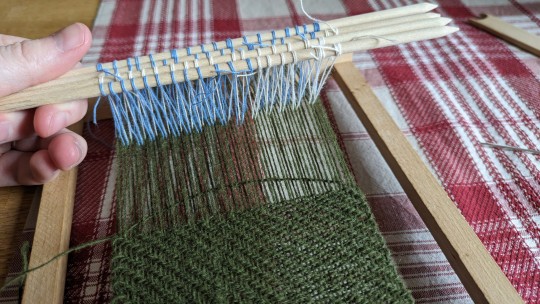
One stick per shaft. Here I'm testing some straight draw twill. 4 shafts.
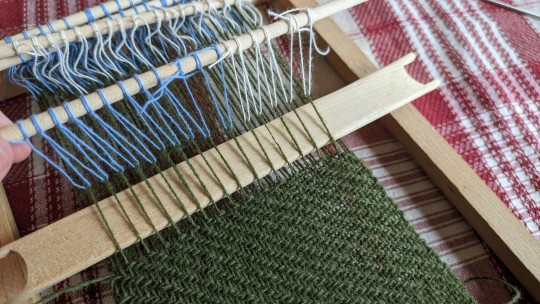
Here I've picked up shaft 4 (because where I live we count the shafts as beginning in the back. 1, 2, 3, 4. So the shaft closest to you will be shaft 4. I realise some of the world count them the opposite way. So felt I needed to clarify.)
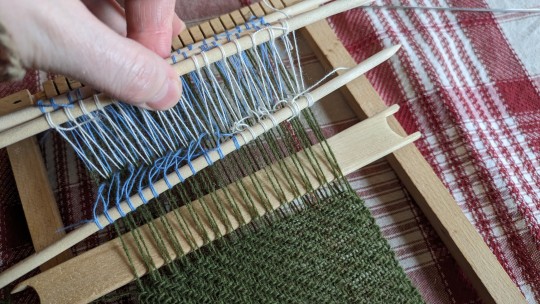
Here I've pulled up shed 2. So shaft 2 and 3.
So to weave a straight draw. I pull up shed 1 (shaft 1 and 2), then shed 2 (shaft 2 and 3), then shed 3 (shaft 3 and 4), then shed 4 (shaft 1 and 4). And finally I start from the beginning again, circling through them over and over.
I learned how to pick up the string heddles from Kerstin Neumüller's book Simple Weave. But I'm sure there are other sources for it out there. It's a really ancient technique, so there ought to be.
It's not difficult. It just takes a while. But considering the alternative is to manually pick up every shed with like a pick-up stick, it's still faster than having to do that.
Hope that's helpful.
103 notes
·
View notes
Text

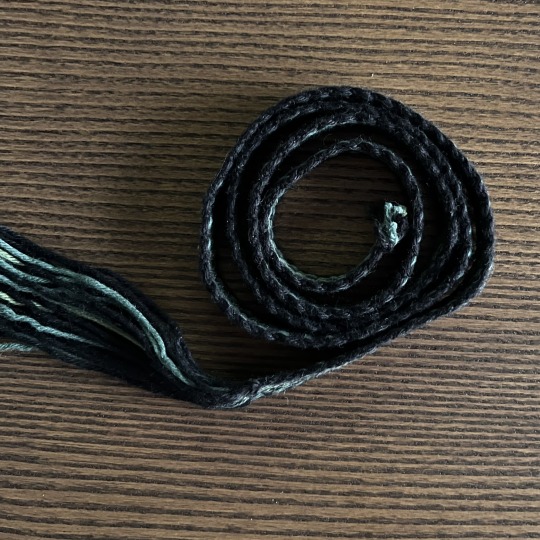
I've woven something! Yesterday I spent almost 6 hours weaving on my backstrap rigid heddle loom, and started + finished this band. It's meant to go around a hat (will share pictures later) as a replacement of a panter-print plastic band that was on it before.
#me myself and i#backstrap rigid heddle loom#backstrap weaving#weaving#rigid heddle band weaving#rigid heddle weaving#yarnblr#yarn crafts
37 notes
·
View notes
Text
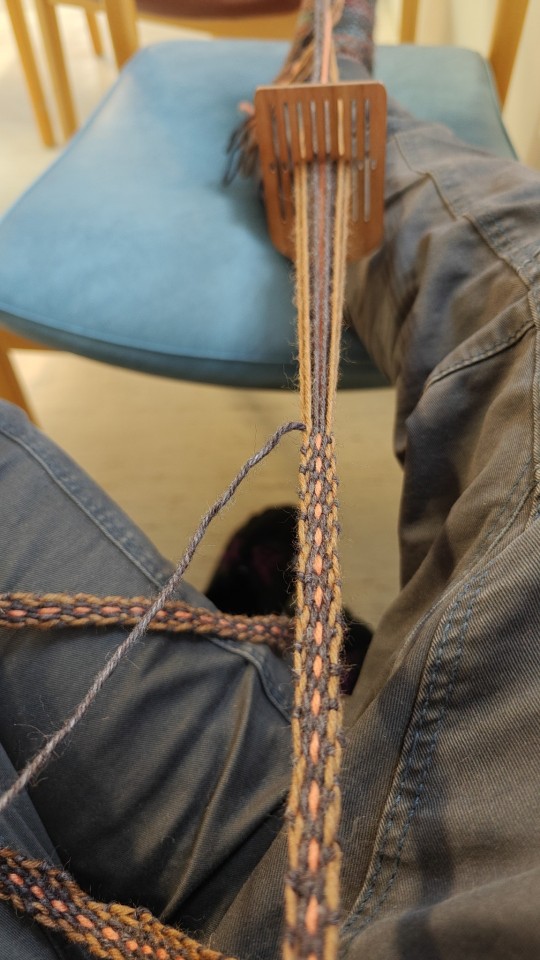
Another day, another band :D
68 notes
·
View notes
Text
went to the FIBER FESTIVAL & acquired one skein cool sock yarn, one lucet fork, and one nälebinding needle. i am a CHAMPION of RESTRAINT, and also i have made a bunch of little sample lucet braids
#i want to make boot laces! i can make flat shoelaces with my rigid heddle backstrap up but i want round laces for my boots#& i think lucet braiding is probably the easiest way to do it? anyway it is fun!#i haven't knitted anything in more than a year and it feels weird. but socks are fun & easy & the yarn is the pretty part#with a lot of crafts i have a weird curve where i'm like I Want To Do The Hardest Thing! & then once i go through that phase#i'm like. um. if i can't do it while watching idiot television then i simply won't do it. which is terrible actually but so it goes#the nälebinding needle is for all of my loom waste also. traditional use u see
12 notes
·
View notes